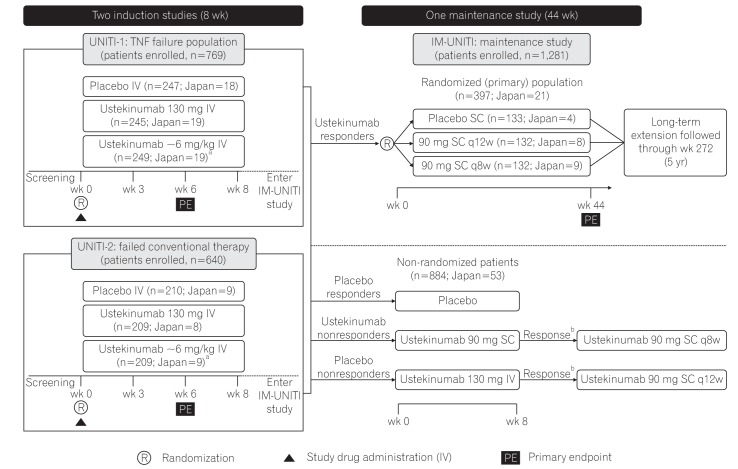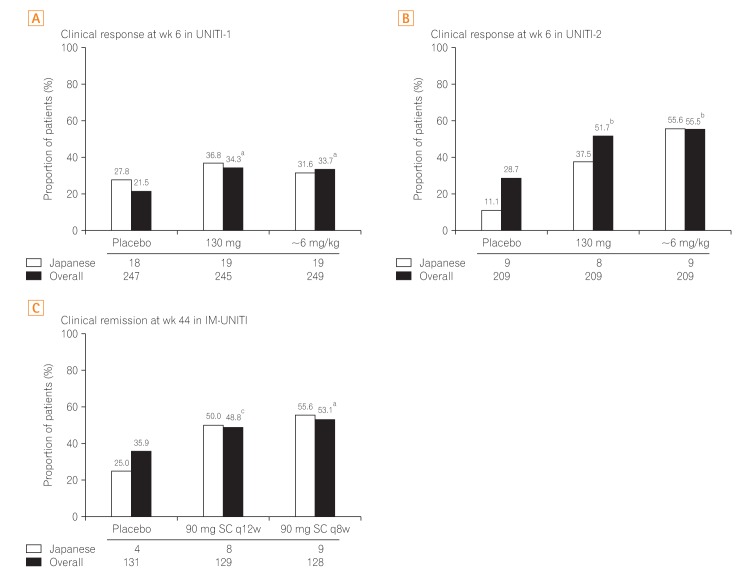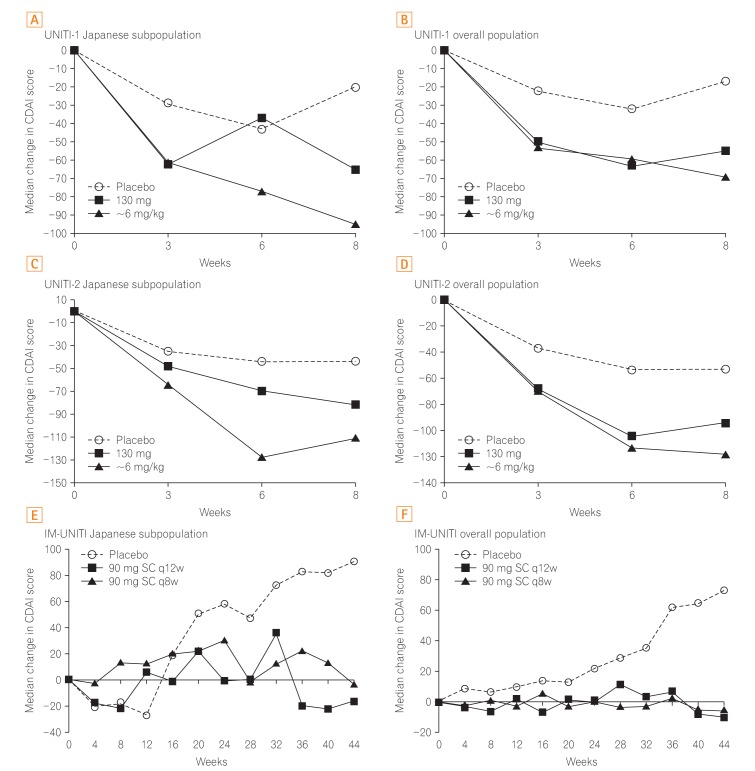Efficacy and safety of ustekinumab in Japanese patients with moderately to severely active Crohn's disease: a subpopulation analysis of phase 3 induction and maintenance studies
- Affiliations
-
- 1Center for Advanced IBD Research and Treatment, Kitasato Institute Hospital, Kitasato University, Tokyo, Japan.
- 2Janssen Pharmaceutical K.K., Tokyo, Japan. yimai@its.jnj.com
- 3Janssen Research & Development, LLC, Spring House, PA, USA.
- KMID: 2396397
- DOI: http://doi.org/10.5217/ir.2017.15.4.475
Abstract
- BACKGROUND/AIMS
Efficacy and safety of ustekinumab were evaluated in a Japanese subpopulation with moderately to severely active Crohn's disease (CD) in UNITI-1, UNITI-2 and IM-UNITI studies and results were compared with the overall population.
METHODS
Overall, patients in UNITI-1 (Japan, n=56; failed response to tumor necrosis factor antagonist) and UNITI-2 (Japan, n=26; failed response to prior conventional therapy) were randomized to placebo or ustekinumab intravenous induction (130 mg or ~6 mg/kg) at week 0. Responders to ustekinumab induction therapy (Japan, n=21) were randomized to placebo or ustekinumab (90 mg, subcutaneous) maintenance (every 12 weeks [q12w] or 8 weeks [q8w]) in IM-UNITI. The primary endpoint was clinical response at week 6 for induction studies and clinical remission at week 44 for maintenance study.
RESULTS
Percentage of patients achieving clinical response at week 6 was greater in ustekinumab 130 mg and ~6 mg/kg groups than in the placebo group (UNITI-1: 36.8% and 31.6% vs. 27.8%, respectively, for Japanese; 34.3% and 33.7% vs. 21.5%, respectively, for overall; UNITI-2: 37.5% and 55.6% vs. 11.1%, respectively, for Japanese; 51.7% and 55.5% vs. 28.7%, respectively, for overall). Clinical remission rate at week 44 during maintenance was greater in the ustekinumab 90 mg SC q12w and q8w groups than in the placebo group (50.0% and 55.6% vs. 25.0%, respectively, for Japanese; 48.8% and 53.1% vs. 35.9%, respectively, for overall). Efficacy and safety results observed in the Japanese subpopulation were generally consistent with those in the overall population.
CONCLUSIONS
Ustekinumab could be considered as a new therapeutic option for moderately to severely active CD in Japanese patients. Both ustekinumab induction and maintenance treatments were generally well tolerated (Clinical Trial Registration: NCT01369329, NCT01369342, NCT01369355).
Keyword
MeSH Terms
Figure
Cited by 4 articles
-
Emerging Therapies: What Are Promising in the Near Future?
Geom Seog Seo, Sung Hee Lee
Korean J Gastroenterol. 2018;71(2):81-88. doi: 10.4166/kjg.2018.71.2.81.Efficacy and safety of ustekinumab in East Asian patients with moderately to severely active ulcerative colitis: a subpopulation analysis of global phase 3 induction and maintenance studies (UNIFI)
Tadakazu Hisamatsu, Hyo Jong Kim, Satoshi Motoya, Yasuo Suzuki, Yoshifumi Ohnishi, Noriyuki Fujii, Nobuko Matsushima, Richuan Zheng, Colleen W. Marano
Intest Res. 2021;19(4):386-397. doi: 10.5217/ir.2020.00080.Ustekinumab is effective in biological refractory Crohn’s disease patients–regardless of approval study selection criteria
Sadik Saman, Martin Goetz, Judith Wendler, Nisar P. Malek, Jan Wehkamp, Thomas Klag
Intest Res. 2019;17(3):340-348. doi: 10.5217/ir.2019.00012.Real-world effectiveness and safety of ustekinumab induction therapy for Korean patients with Crohn’s disease: a KASID prospective multicenter study
Kyunghwan Oh, Hee Seung Hong, Nam Seok Ham, Jungbok Lee, Sang Hyoung Park, Suk-Kyun Yang, Hyuk Yoon, You Sun Kim, Chang Hwan Choi, Byong Duk Ye
Intest Res. 2023;21(1):137-147. doi: 10.5217/ir.2021.00173.
Reference
-
1. Abraham C, Cho JH. Inflammatory bowel disease. N Engl J Med. 2009; 361:2066–2078. PMID: 19923578.
Article2. Loftus EV Jr. Clinical epidemiology of inflammatory bowel disease: incidence, prevalence, and environmental influences. Gastroenterology. 2004; 126:1504–1517. PMID: 15168363.
Article3. Ananthakrishnan AN. Epidemiology and risk factors for IBD. Nat Rev Gastroenterol Hepatol. 2015; 12:205–217. PMID: 25732745.
Article4. Asakura K, Nishiwaki Y, Inoue N, Hibi T, Watanabe M, Takebayashi T. Prevalence of ulcerative colitis and Crohn’s disease in Japan. J Gastroenterol. 2009; 44:659–665. PMID: 19424654.
Article5. Ng WK, Wong SH, Ng SC. Changing epidemiological trends of inflammatory bowel disease in Asia. Intest Res. 2016; 14:111–119. PMID: 27175111.
Article6. Hu PJ. Inflammatory bowel disease in Asia: the challenges and opportunities. Intest Res. 2015; 13:188–190. PMID: 26130991.
Article7. Ng SC, Tang W, Leong RW, et al. Environmental risk factors in inflammatory bowel disease: a population-based case-control study in Asia-Pacific. Gut. 2015; 64:1063–1071. PMID: 25217388.
Article8. Kanai T, Matsuoka K, Naganuma M, Hayashi A, Hisamatsu T. Diet, microbiota, and inflammatory bowel disease: lessons from Japanese foods. Korean J Intern Med. 2014; 29:409–415. PMID: 25045286.
Article9. Amiot A, Peyrin-Biroulet L. Current, new and future biological agents on the horizon for the treatment of inflammatory bowel diseases. Therap Adv Gastroenterol. 2015; 8:66–82.
Article10. Tanida S, Ozeki K, Mizoshita T, et al. Managing refractory Crohn’s disease: challenges and solutions. Clin Exp Gastroenterol. 2015; 8:131–140. PMID: 25914555.11. Hanauer SB, Feagan BG, Lichtenstein GR, et al. Maintenance infliximab for Crohn’s disease: the ACCENT I randomised trial. Lancet. 2002; 359:1541–1549. PMID: 12047962.
Article12. Hanauer SB, Sandborn WJ, Rutgeerts P, et al. Human anti-tumor necrosis factor monoclonal antibody (adalimumab) in Crohn’s disease: the CLASSIC-I trial. Gastroenterology. 2006; 130:323–333. PMID: 16472588.
Article13. Colombel JF, Sandborn WJ, Rutgeerts P, et al. Adalimumab for maintenance of clinical response and remission in patients with Crohn’s disease: the CHARM trial. Gastroenterology. 2007; 132:52–65. PMID: 17241859.
Article14. Sandborn WJ, Feagan BG, Stoinov S, et al. Certolizumab pegol for the treatment of Crohn’s disease. N Engl J Med. 2007; 357:228–238. PMID: 17634458.
Article15. Benson JM, Peritt D, Scallon BJ, et al. Discovery and mechanism of ustekinumab: a human monoclonal antibody targeting interleukin-12 and interleukin-23 for treatment of immune-mediated disorders. MAbs. 2011; 3:535–545. PMID: 22123062.16. Leonardi CL, Kimball AB, Papp KA, et al. Efficacy and safety of ustekinumab, a human interleukin-12/23 monoclonal antibody, in patients with psoriasis: 76-week results from a randomised, double-blind, placebo-controlled trial (PHOENIX 1). Lancet. 2008; 371:1665–1674. PMID: 18486739.
Article17. Igarashi A, Kato T, Kato M, Song M, Nakagawa H;. Efficacy and safety of ustekinumab in Japanese patients with moderate-to-severe plaque-type psoriasis: long-term results from a phase 2/3 clinical trial. J Dermatol. 2012; 39:242–252. PMID: 21955098.
Article18. Sandborn WJ, Gasink C, Gao LL, et al. Ustekinumab induction and maintenance therapy in refractory Crohn’s disease. N Engl J Med. 2012; 367:1519–1528. PMID: 23075178.
Article19. Feagan BG, Sandborn WJ, Gasink C, et al. Ustekinumab as induction and maintenance therapy for Crohn’s disease. N Engl J Med. 2016; 375:1946–1960. PMID: 27959607.20. Ministry of Health, Labour and Welfare. Basic principles on global clinical trials. Tokyo: Ministry of Health, Labour and Welfare;2007.21. Ministry of Health, Labour and Welfare. Basic principles on global clinical trials (reference cases). Tokyo: Ministry of Health, Labour and Welfare;2012.22. Liu JZ, van Sommeren S, Huang H, et al. Association analyses identify 38 susceptibility loci for inflammatory bowel disease and highlight shared genetic risk across populations. Nat Genet. 2015; 47:979–986. PMID: 26192919.
Article23. Inoue N, Tamura K, Kinouchi Y, et al. Lack of common NOD2 variants in Japanese patients with Crohn’s disease. Gastroenterology. 2002; 123:86–91. PMID: 12105836.
Article24. Yang SK, Hong M, Baek J, et al. A common missense variant in NUDT15 confers susceptibility to thiopurine-induced leukopenia. Nat Genet. 2014; 46:1017–1020. PMID: 25108385.
Article25. Papp KA, Griffiths CE, Gordon K, et al. Long-term safety of ustekinumab in patients with moderate-to-severe psoriasis: final results from 5 years of follow-up. Br J Dermatol. 2013; 168:844–854. PMID: 23301632.
Article26. Gottlieb AB, Kalb RE, Langley RG, et al. Safety observations in 12095 patients with psoriasis enrolled in an international registry (PSOLAR): experience with infliximab and other systemic and biologic therapies. J Drugs Dermatol. 2014; 13:1441–1448. PMID: 25607786.27. Kavanaugh A, Puig L, Gottlieb AB, et al. Maintenance of clinical efficacy and radiographic benefit through two years of ustekinumab therapy in patients with active psoriatic arthritis: results from a randomized, placebo-controlled phase III trial. Arthritis Care Res (Hoboken). 2015; 67:1739–1749. PMID: 26097039.
Article
- Full Text Links
- Actions
-
Cited
- CITED
-
- Close
- Share
- Similar articles
-
- Efficacy and safety of mirikizumab as induction and maintenance therapy for Japanese patients with moderately to severely active ulcerative colitis: a subgroup analysis of the global phase 3 LUCENT-1 and LUCENT-2 studies
- The Phase 3 Trials of Ustekinumab as Induction and Maintenance Therapy for Crohn's Disease
- Efficacy and safety of ustekinumab in East Asian patients with moderately to severely active ulcerative colitis: a subpopulation analysis of global phase 3 induction and maintenance studies (UNIFI)
- Efficacy and safety of filgotinib as induction and maintenance therapy for Japanese patients with moderately to severely active ulcerative colitis: a post-hoc analysis of the phase 2b/3 SELECTION trial
- Efficacy and safety of vedolizumab in Crohn’s disease in patients from Asian countries in the GEMINI 2 study




